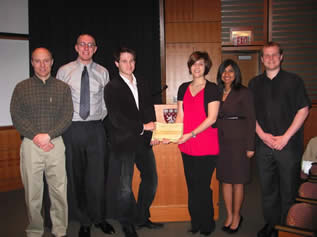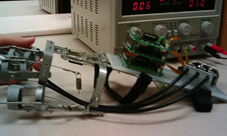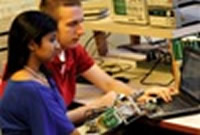 A combined 450,000 Americans suffer from debilitative disorders, such as multiple sclerosis and muscular dystrophy, resulting in the loss of muscle strength and dexterity in the hand. To combat this condition the Biomedical Engineering design team of, Donald Bucci, Sana Fathima, Erik Hage, Cory Hofmann, Katherine Reuther, and Michele Rotella, designed the PC-HAND, a pressure controlled and battery powered glove-like exoskeleton that can assist in the grasping and pinching of objects. The PC-HAND utilizes the user’s residual hand strength to control the motion of the glove not only mimicking the movement but amplifying the intended grasping or pinching motion.
A combined 450,000 Americans suffer from debilitative disorders, such as multiple sclerosis and muscular dystrophy, resulting in the loss of muscle strength and dexterity in the hand. To combat this condition the Biomedical Engineering design team of, Donald Bucci, Sana Fathima, Erik Hage, Cory Hofmann, Katherine Reuther, and Michele Rotella, designed the PC-HAND, a pressure controlled and battery powered glove-like exoskeleton that can assist in the grasping and pinching of objects. The PC-HAND utilizes the user’s residual hand strength to control the motion of the glove not only mimicking the movement but amplifying the intended grasping or pinching motion.
Previously designed assistive machines were severely limited in their mobility and bulk. Most other similar devices only strengthen a person’s pinching motion or a person’s grasping motion, but not both. Additionally, many other devices utilized pistons instead of the cables used by the PC Hand. Thus these other devices were often unwieldy and awkward to use. The TCNJ design team was determined to improve upon those designs by not only increasing range of motion and making it less cumbersome but also by making the PC-HAND adjustable to several different hand sizes. “As biomedical engineers, it is our task to increase the quality of life in any form of healthcare through engineering design. Current orthotic assistive exoskeleton designs leave a lot of room for improvement,” says recent graduate Cory Hofmann.
The PC Hand and its team have already found recognition. Two short papers documenting the early status of the mechanical and electrical components of the PC-HAND were published in the Proceedings of the Institute of Electrical Electronics Engineers (IEEE) 35th Annual Northeast Bioengineering Conference in Boston, MA. The senior design team was also awarded an honorable mention for their presentation at the conference, being among the top 6 of 175 entries. Furthermore, the PC-HAND team won the 2009 IEEE Region I Student Conference Undergraduate Paper Contest. Their paper will be included in an IEEE Proceeding to be published later in 2009. “The professionalism of the design team was extraordinary. The students presented their findings as posters and oral presentations at three separate conferences during the spring of 2009, and every effort was of the highest caliber,” says Dr. Brett BuSha who acted as the faculty advisor for the award winning team.


Though the majority of the PC HAND design team has graduated and moved on to continue their education at such prestigious institutions as the University of Pennsylvania, Boston University, and Penn State, the journey of the PC-HAND is not complete. Having successful received institutional approval for human testing the aim is to collect more data which will not only validate the design, but will be used to explore the possibility that such a device as the PC-Hand can work on even less initial muscle force. It is the hope of the entire team that their design project can be just the beginning in a long series of devices which will eventually result in a mass-produced and easily affordable device which would allow those suffering from severe muscular disorders to be able to once again have a full use of their hands.
Learn More
Award winning paper
